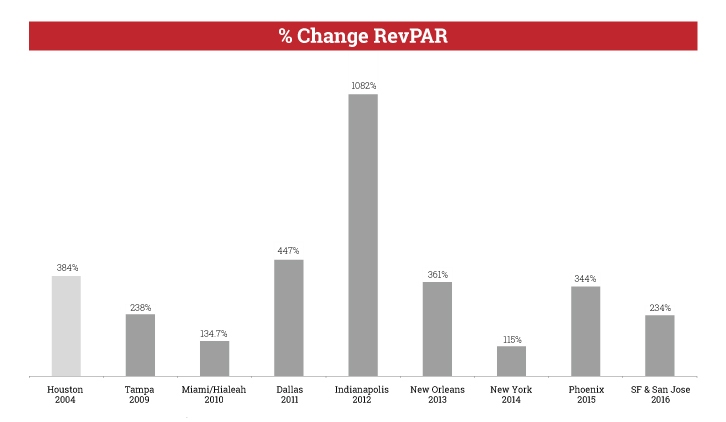BROOMFIELD, Colorado—Houston’s hotels have been suffering through the impact of low oil prices, while much of the rest of the country's hotels are enjoying record-level performance. But Super Bowl LI offers one bright spot in a very tough and generally bleak hotel market.
What can Houston hoteliers expect in terms of lift from the event, which will be held in Houston’s NRG Stadium on 5 February?
The answer can come from analyzing how other cities’ hotels have fared when hosting the Super Bowl, as well as looking at Houston’s hotel performance when it last hosted the event in 2004. The following table details the year-over-year revenue-per-available-room percent change for Super Bowl weekend (Friday, Saturday and Sunday nights).
Super Bowl Weekend RevPAR % Change vs prior year day-to-day

Source: STR
As mentioned in STR's 2016 Super Bowl analysis, Indianapolis had a boggling 1,000%+ RevPAR increase, though this city had the lowest performance basis to be measured against. The other results were mixed, but looking back to Houston’s own performance in 2004, the increase of nearly 400% was third-highest of the years studied. Most recently, Phoenix and San Francisco enjoyed increases of 344% in 2015 and 234% in 2016, respectively.
While there don’t appear to be any directional trends about how a Super Bowl affects a local hotel market, a few things appear to be true regarding this event:
- The larger the host market, the lower the overall RevPAR percent increase. This makes sense, as the net positive effect is spread among more hotels (see New York, 2014).
- Markets with consistently strong February performance will experience a lower RevPAR increase (New York, San Francisco).
- Alternative accommodations, like Airbnb, will continue to be a major factor of erosion of potential hotel performance gains during major events.
The most difficult part of guessing how Houston will fare comes from the fact that Houston’s hotel market is (and has been) on the downturn. One could surmise that since hotel performance is currently soft, a strong Super Bowl turnout will allow for a sharp spike in year-over-year performance. Alternatively, that same soft performance could just extend to the Super Bowl, resulting in an underwhelming RevPAR increase.
All of this makes the Tampa and Miami results in the above chart very interesting. In 2009 and 2010, the hotel industry was in a tailspin, with RevPAR levels sinking rapidly. In those years, Tampa and Miami posted Super Bowl RevPAR gains of 238% and 135%, respectively, clearly among the lowest levels of the years studied. But in those years, the country as a whole was in a recession, which perhaps resulted in a muted desire to spend huge amounts of cash attending a Super Bowl. This year, while the city of Houston might be facing a tough lodging economy, the national economy as a whole is strong.
In further analyzing Houston’s past as a Super Bowl host, we can zoom in and take a look at the daily performance for this market during the 2004 Super Bowl weekend.
2004 Super Bowl weekend in Houston

Source: STR
Houston registered significantly higher RevPAR during the 2004 Super Bowl weekend compared to that same weekend of the prior year. As expected, due to demand, RevPAR was stronger on Saturday, the day before the game. However, in terms of RevPAR percent change, Sunday had higher gains (411.1% increase).
Overall, while it’s difficult to forecast, it’s not unreasonable to think Houston hotels could experience a RevPAR increase of between 150% and 350% during Super Bowl weekend this year. But there’s no question a Super Bowl provides a tremendously positive impact for any host city.
As evidence of this, we can compare the impact the Super Bowl has on the RevPAR of cities that host other major national events—to make a more apples-to-apples comparison, we filtered down the events to those that are hosted in different cities each year. Please note the Super Bowl percent-change numbers do not match those of previous charts since the analysis below is for the three submarkets closest to the event (rather than the entire market).

Source: STR
We will let the numbers (and bars) speak for themselves here. Rest assured Houston: As far as the Super Bowl is concerned, we do not have a problem.
This article represents an interpretation of data collected by STR, parent company of HNN. Please feel free to comment or contact an editor with any questions or concerns.